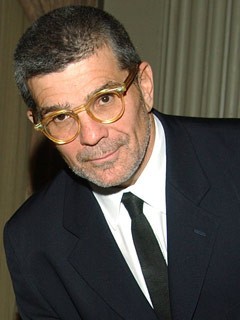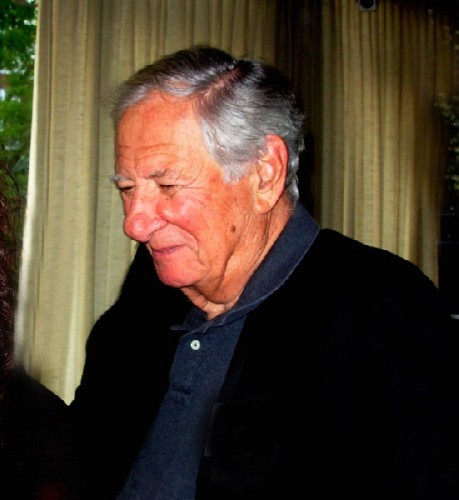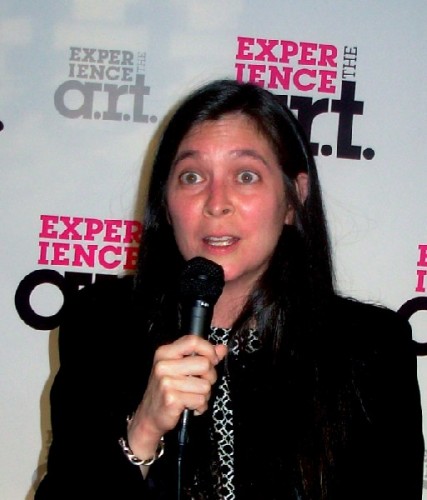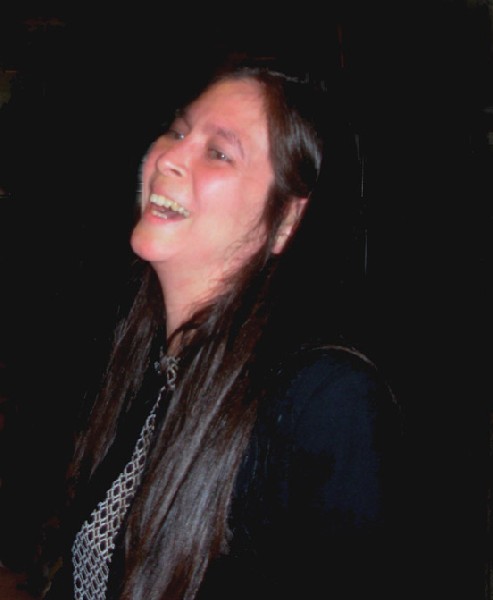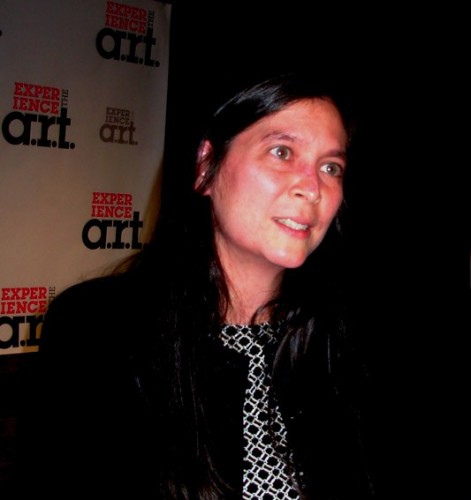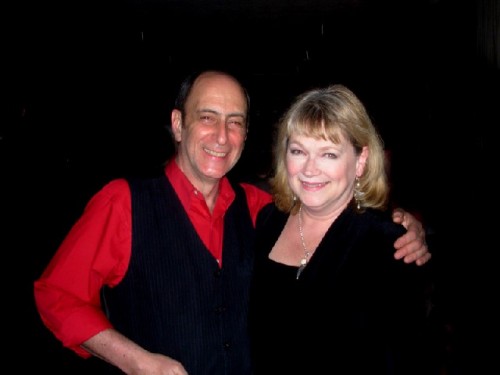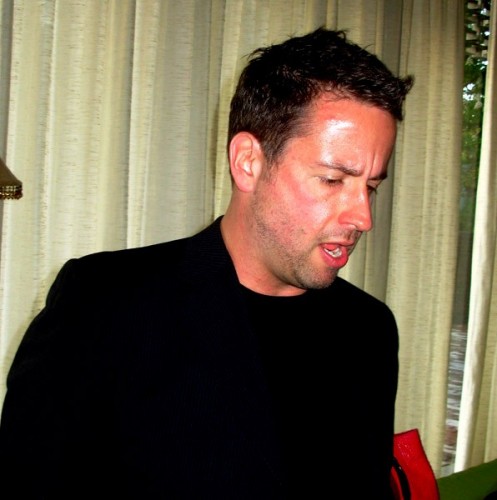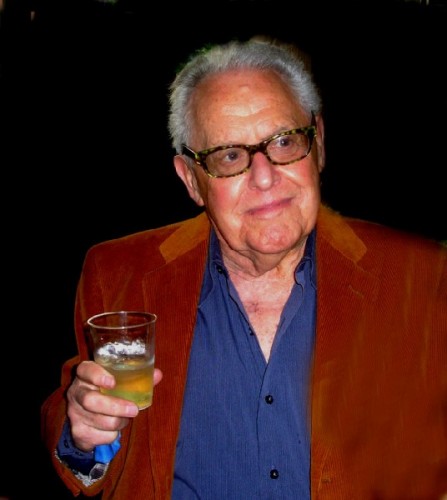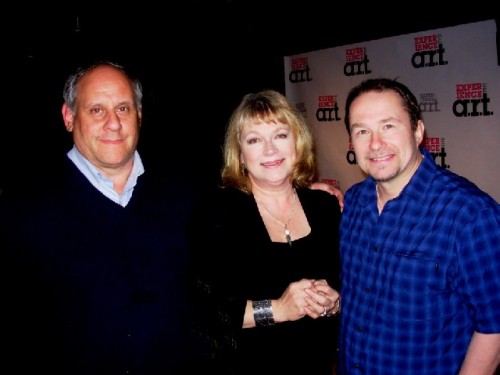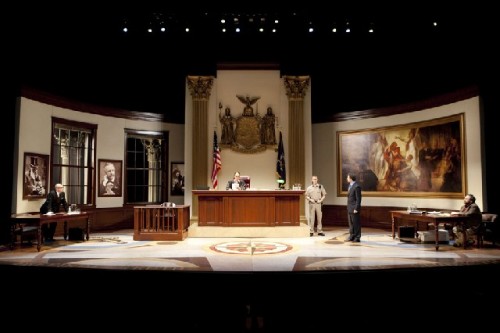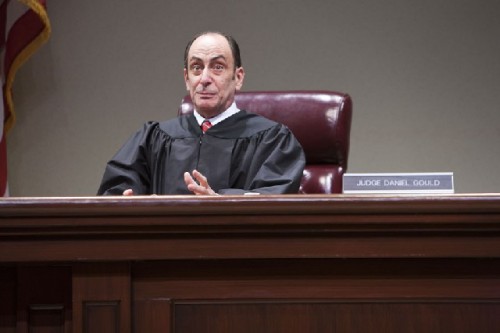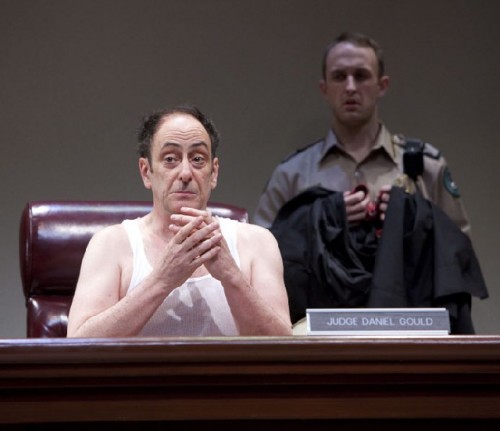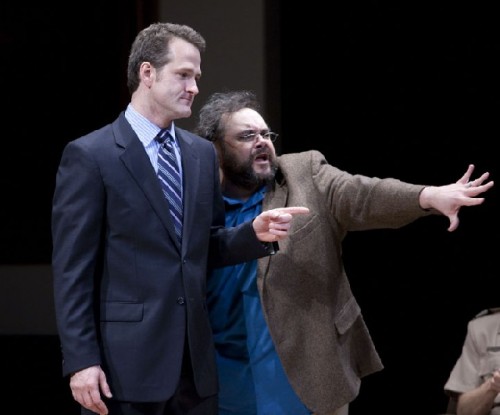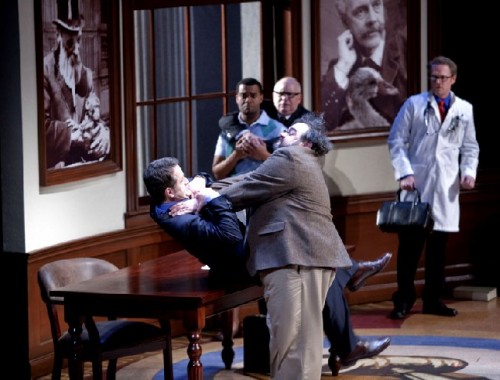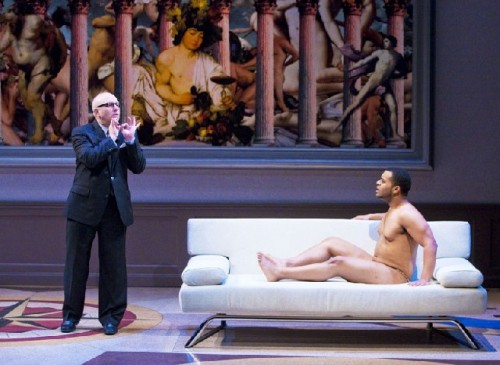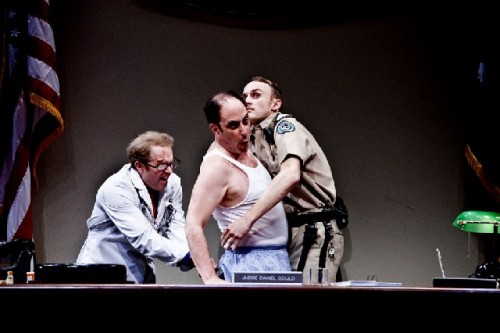David Mamet's Romance at American Repertory Theatre
Courtroom Farce Makes a Mockery of the Law
By: Charles Giuliano - May 17, 2009
Romance
By David Mamet
Directed by Scott Zigler; Set Design, J. Michael Griggs; Costume Design, Miranda Hoffman; Lighting Design, D.M.Wood; Sound Design, David Remeidos; Production Stage Manager, Katherine Shea; Dramaturg, Sean Bartley; Vocal Coach, Jane Guyer
Cast: Prosecutor, Thomas Derrah, Defendant, Remo Airaldi, Defense Attorney, Jim True-Frost, Judge, Will LeBow, Baliff, Jim Senti, Bernard, Carl Foreman, Doctor, Doug Chapman.
American Repertory Theatre
May 9 through June 7
The Loeb Drama Center
64 Brattle Street, Cambridge
617 547 8300
Seriously Funny: Shorts by David Mamet, Harold Pinter, and Shel Silverstein
Zero Arrow Theater
June 11 through June 28
Sexual Perversity in Chicago and The Duck Variations
Zero Arrow Theater
June 11 through June 28
A panhandler asks a passing gentleman for some spare change. The man rather archly chastises the beggar stating imperiously "Neither a borrower nor a lender be for loan oft loses both itself and friend. Williams Shakespeare." As the gentleman walks by the homeless person calls after him "F You, You F'n F. David Mamet."
Typically the Mamet play "Romance" at the American Repertory Theatre, through June 7, is laced with profanities as it manages to insult Gays, Jews, Blacks, pedophile Catholic priests, and Republicans in a farcical non stop screed that has audiences rolling in the aisles.
But other than the ribald language and farcical situations played out in a Southern Court Room I haven't a F'n clue what the F it's all about if you F'n know what I F'n mean. And if you expect me to explain it well, F You, You F'n F.
Just kidding but you get the idea. Given that American Repertory Theatre is a pretty high brow institution just what is all this foul language doing on posh Brattle Street?
Some clues to the madcap performance were provided during a VIP reception for patrons and friends in the lobby prior to curtain. Having nearly completed her first full season as artistic director of ART, Diane Paulus, who has been nominated for a Tony Award for directing the Broadway revival of "Hair," offered some background. As did Gideon Lester the director for the 2008/2009 season.
This season at the Loeb Drama Center has seen successive productions of Chekhov's "The Seagull," Beckett's "Endgame," (a second opinion on Endgame) and now Mamet's "Romance." Paulus explained how Beckett was influenced by the realism and ironic humor of Chekhov and that Mamet has acknowledged Beckett as the greatest playwright of the 20th Century and the most significant influence on his own approach to theatre.
Paulus discussed the long standing and very special relationship between Mamet and ART which has premiered "Oleanna" "Cryptogram" "The Old Neighborhood" and "Boston Marriage." "Romance" (2005) is one of three ART productions forming a mini Mamet Festival. The other two performances will include "Seriously Funny: Shorts by David Mamet, Harold Pinter, and Shel Silverstein" (May 29 through June 6) and "Sexual Perversity in Chicago and the Duck Variations" (June 11-June 26) both at ART's Zero Arrow Theater.
In the Berkshires there will be a reading of a new play by Mamet at the Mahaiwe Performing Arts Center, in Great Barrington, on May 29. The occasion is a benefit for the Berkshire Playwrights Lab. At ART we talked with the actor Jim Frangione, who, with Bob Jaffe, is a cofounder of the Lab. He has acted in a number of Mamet's productions and urged us to attend the Mahaiwe event.
On many levels David Mamet (born November 30, 1947) is one of the most productive and successful playwrights of his generation. He was just 23, in 1970, when his first play "Lakeboat" was produced. He earned Tony Award nominations for "Glengarry Glen Ross" (1984) and "Speed the Plow" (1988) both of which had recent Broadway revivals. As a screenwriter he has been nominated for Academy Awards for "The Verdict" (1982) and "Wag the Dog" (1997). On TV he is a primary writer for "The Unit." He is scheduled to direct a new play on Broadway this fall.
The progression between Chekhov, Beckett and Mamet this season at ART, a program assembled by Gideon Lester, is inspired and insightful. In a bit of legerdemain one elides from the Theatre of the Absurd of Beckett, rooted in Post War ennui and existentialism, to the just plain Absurd Theatre of Mamet with its farcical send up of American dialect. Trash talk became his signature style as early as "Sexual Perversity in Chicago" (1974) and "American Buffalo" (1975). Since then he has built a career around the lives of losers, hustlers, perverts and con artists. He has been a bottom feeder of our society what Noel Coward and Cole Porter were to its upper class. Mamet has suffered the black lung disease of mining the underbelly of a vernacular American society.
Still, for all the soot and grime, there is a touch of the Blarney like the soft shoe vaudevillian shuffle of Vladimir and Estragon during their more comic sequences in "Waiting for Godot." Evoking Beckett often means that Mamet makes no sense. Their works are less about plot and meaning than a sublime and inspired use of the ordinary pitter patter and fractures of the spoken word as it has devolved in the current era. As in Sartre's "No Exit" which ART produced brilliantly a couple of seasons ago "Hell is other people."
One approach to getting a handle on Beckett and Mamet is provided by Susan Sontag's "Against Interpretation" (1963). In a contemporary construct from Beckett to Pinter and Mamet it is not necessary to understand so much as to just be. In the itness of the it there is the idea of just "Being There." As Woody Allen put it "80 percent of success is just showing up." No, Godot does not arrive. Waiting is the point and the message is couched in poetic irony of that expectation. We would all like to know what is going on but the hipster take on our apocalyptic nuclear society is to stop acting paranoid and Learn to Love the Bomb. If we are all doomed by overkill then don't worry about it. Live for today as there is no tomorrow. Get real. That noir irony started with Chekhov.
Lay back and enjoy the show as there isn't much you can do about it. Like the current economy, stupid. Dramas that have plots and explore issues seem so trite, polemical, strident and boring. There are no answers, is the Mamet mantra, just questions and that wonderful fractured, farcical language. The poetry uttered by trailer trash and miscreants.
Yes, there is a plot to "Romance" I suppose, kindah, in a way. Something about a trial in civil court over a broken contract. But it's not about that. The play is really about "Romance" or something. The characters, an all male cast, are in bed with each other. Even the judge and bailiff may be an item. So this is a sex farce in the tradition of Restoration comedy but with no women.
As always with an ART production the greatest delight is the manner in which its marvelous company of actors have been adapted to the play. The casting of Will LeBow as the deranged, pill popping, total gonzo judge is particularly inspired. As the play progresses, in an allegory of blind justice, the judge becomes ever more deranged. This culminates with the judge taking his clothes off in court and having to be subdued by a doctor.
Truly, LeBow is one of the most talented and versatile actors working in Boston. In addition to ART he also performs with the Huntington Theatre Company. I will long remember his strong performance in Chekhov's "The Cherry Orchard" Overall his range from drama to comedy is just astonishing.
It is always intriguing to see what Remo Airaldi brings to a role. Here he plays the angry and sharp tongued defendant who fights with his attorney (Jim True-Frost). The defendant is a chiropractor who may have assaulted a chiropodist and has a prescription for world peace. There is a Peace Confernce going on outside the court house. During the cross examination by the prosecutor, Thomas Derrah, we never get a straight answer. There is something about an alleged trip to Hawaii which may or may not have happened. And, if it did, with whom? Is this making any sense? Not really, well, that's the point or lack thereof.
During intermission there was conversation with friends about what the F was going on. In the second act there weren't any answers but the farce just got more and more ridiculous. Astrid wanted to know where were the five doors? But this is contemporary farce in which the slamming doors yield to absurdist non sequetors of dialogue.
So I really don't know what this play was about. But I really don't care. It may not be Mamet's best effort but really, so what. Rarely have we left the theatre feeling so thoroughly entertained. It was pretty F'n funny if you F'n know what I F'n mean.

